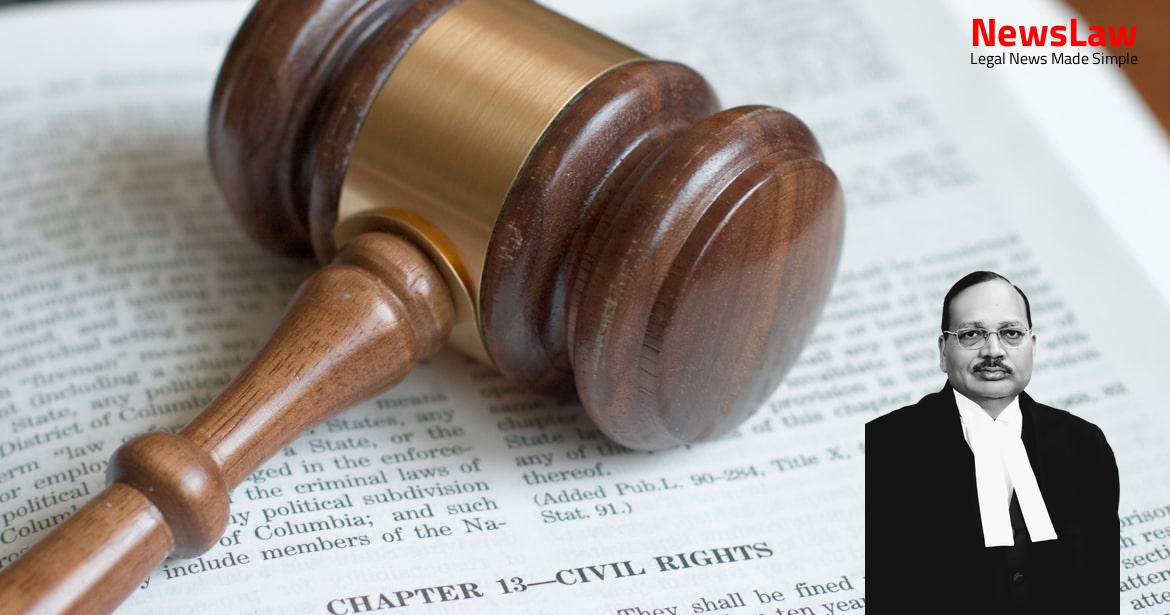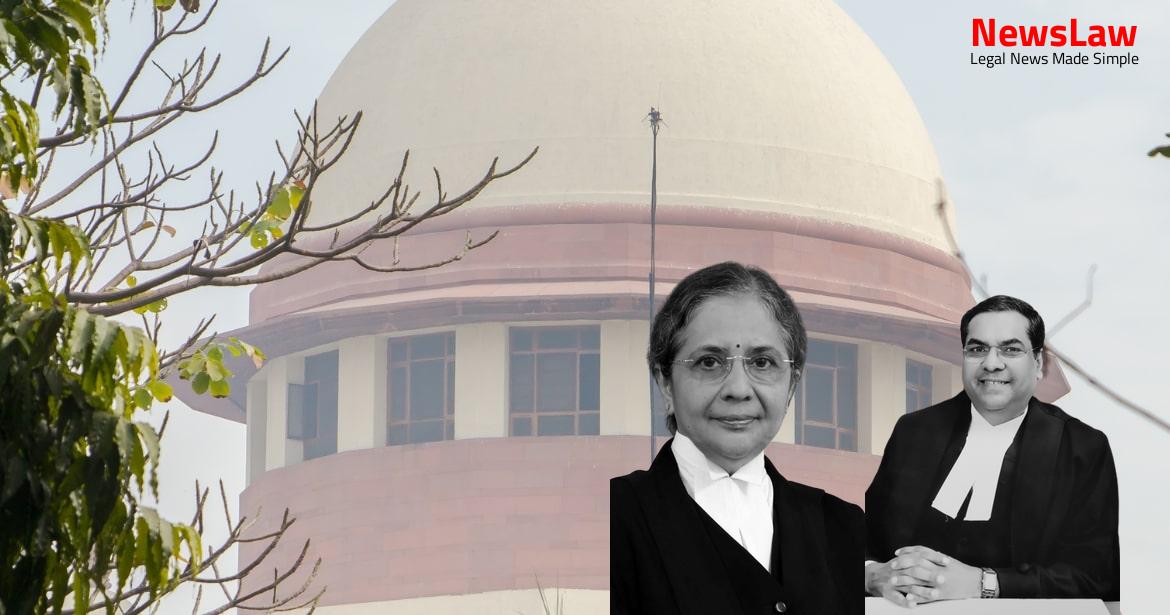Delve into a significant legal case where the Supreme Court of India played a crucial role in resolving a dispute between parties. The case involved Pritam Singh and State as well as Penu Balakrishna Iyer among others, leading to a landmark judgement that serves as a cornerstone in India’s legal framework.
Facts
- The appellant offered the lowest cost for executing the work and was issued the Letter of Intent.
- The High Court allowed the intra court appeal filed under clause 15 of the Letters Patent.
- The re-verification about the distance by the Chief Engineer was considered legal by the learned Single Judge.
- Technical bids were opened on 18.05.2018, and the price bid was opened on 31.05.2018, where both the fourth respondent and the appellant were qualified.
- The dispute arose regarding the distance from the Hot Mix Plant to the work site, leading to complaints and verifications.
- Reports from Superintending Engineers were obtained to verify the distance between the Hot Mix Plant and the working reach point.
- The distance was finally verified to be 98.1 kilometers by the Superintending Engineer, Karimnagar, leading to the tender being finalized in favor of the appellant.
- The tender process involved bids from both the appellant and the fourth respondent.
- The tender notice was floated for the construction of a BT Road in Mahabubabad District.
- Proof of owning a Batch Type Hot Mix Plant within 100 kilometers from the working reach point was required as per the tender conditions.
- The Division Bench of the High Court found fault with the report of the Superintending Engineer, Warangal, regarding distance particulars from the alternate route.
- The Single Judge dismissed the Writ Petition filed under Article 226 of the Constitution of India.
- The Division Bench allowed the intra court appeal and directed to award the work based on a report submitted by the Superintending Engineer, Warangal.
- Senior counsels represented the appellant, the fourth respondent/writ petitioner, and the State respectively during the proceedings.
Also Read: State of West Bengal vs. Respondents: Abetment of Suicide Case
Arguments
- The appellant has offered to execute the work at a lower cost than the fourth respondent.
- The dispute regarding the distance from the appellant’s Hot Mix Plant is being re-verified by independent authorities.
- The Superintending Engineer’s report certifies the distance to be within 100 kilometers, supporting the appellant’s claim.
- The Chief Engineer’s decision to call for a report from the Superintending Engineer, Karimnagar, is disputed by the fourth respondent.
- The fourth respondent argues that there are no grounds to interfere with the High Court’s order.
- Various reports show discrepancies in the measured distance, leading to conflicting claims.
- The tender conditions require owning a Hot Mix Plant within 100 kilometers, which the appellant has demonstrated.
- No prescribed procedure for verification in the event of complaints is mentioned in the tender conditions.
- The Single Judge’s decision is supported as no illegality or arbitrariness in the decision-making process is found.
- The appellant argues that the intra-court appeal lacked valid reasons for interference.
- The appellant cites various judgments to support their arguments against the interference under Article 136 of the Constitution of India.
- The respondent has relied on the judgments of Pritam Singh v. State.
- The respondent has also relied on the judgment of Penu Balakrishna Iyer & Ors. v. Ariya M. Ramaswamy Iyer & Ors.
- Furthermore, the respondent has cited the case of Shaikh Ali Hossain & Ors. v. Shaikh Showkat Ali & Anr.
Also Read: Judgment in Crl. Revision Petition No. 02/2011
Analysis
- The Division Bench of the High Court set aside the Chief Engineer’s decision based on a technicality of calling a report from the Superintending Engineer, Karimnagar, who was not the concerned Engineer according to procedure.
- The appellant’s bid was significantly lower than the fourth respondent’s bid for executing the work in question.
- The procedures followed by the Chief Engineer in obtaining a report from an independent authority were found fair and acceptable by the Single Judge.
- The High Court cannot act as an appellate court to review tender evaluation and set aside tender awards.
- The appellant was compliant with tender requirements of owning a Hot Mix Plant within 100 kilometers.
- In absence of prescribed procedures for verification in case of complaints, it was fair for the Chief Engineer to seek a report from an independent Superintending Engineer.
- The Superintending Engineer, Karimnagar, ultimately measured the distance between the Hot Mix Plant and the last point of working reach at 98.1 kilometers.
- The Chief Engineer’s actions in calling for re-verification from an independent authority were deemed just and reasonable.
- The scope of interference by the Court was limited to the decision-making process and not the merits of the decision itself.
- In the case of Afcons Infrastructure Limited v. Nagpur Metro Rail Corporation Limited and Another, the High Court was found at fault for interfering with the decision of the authority in contract and tender matters without any malice, irrationality, or perversity in the procedure.
- In Consortium of Titagarh Firema Adler v. Nagpur Metro Rail Corporation Ltd., it was established that judicial review is justified if the approach is arbitrary, mala fide, or if the procedure is intended to favor someone.
- In the case of Municipal Corporation, Ujjain and Anr. v. BVG India Ltd. & Ors., a report was used in the decision-making process to open the bid of the appellant in Part-II.
- In Tata Cellular v. Union of India, it was ruled that State decisions/actions regarding Government contracts must align with Article 14 of the Indian Constitution.
- It was stated that judicial review in contract matters is limited to the decision-making process, not the decision itself. Courts cannot act as appellate courts when reviewing contract and tender issues.
- In the case of Management of Narendra & Company Pvt. Ltd. v. Workmen of Narendra & Company, the scope of the intra court appeal was considered.
- The Court held that the findings of the learned Single Judge should not be disturbed unless they are found to be perverse by the Appellate Bench.
- The appeal in this case was allowed, setting aside the order passed in Writ Appeal No 153 of 2019 by the High Court of Telangana at Hyderabad.
- The order dated 25.02.2019 passed by the learned Single Judge in Writ Petition No 23501 of 2018 was confirmed.
- No costs were awarded in this judgement.
Also Read: Partnership Dissolution Case: Legal Heirs’ Rights Upheld
Case Title: M/S N RAMACHANDRA REDDY Vs. THE STATE OF TELANGANA
Case Number: C.A. No.-006673-006673 / 2019



